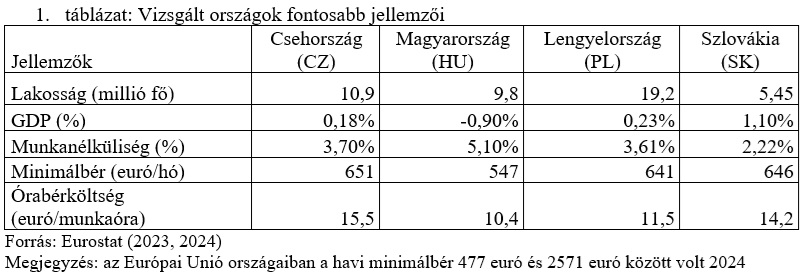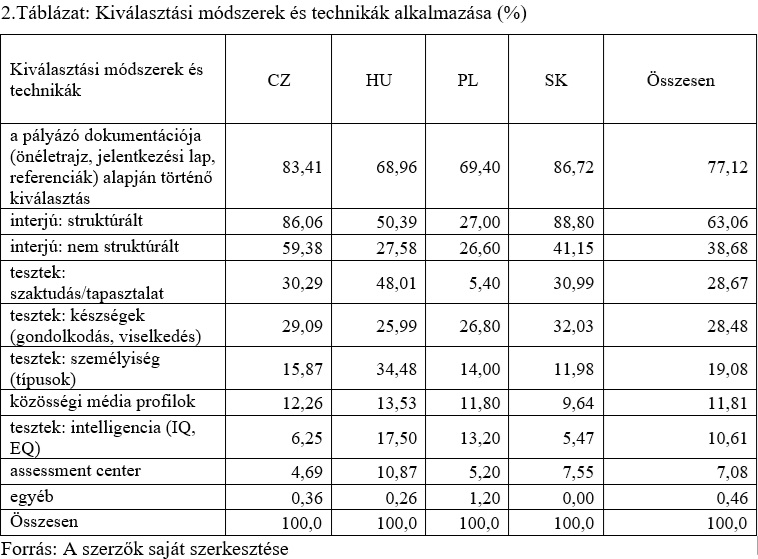How the relationship between workers and employers has changed in the V4 countries
In recent years, the labour market in the former Eastern European bloc countries and the V4 countries has undergone significant changes, which have also changed the relationship between workers and employers. One of the key issues in these countries is the dramatic increase in labour shortages, which have been influenced by demographic factors, emigration and wage differentials within the EU, among other factors. An empirical study has investigated the characteristics of HR systems in the V4 countries. The authors of the article are József Poór, Professor Emeritus, President of HSZOSZ, MATE, Zsolt Sándor Kőmüves, Associate Professor, MATE and Gábor Szabó Szengróti, Associate Professor, Széchenyi István University.
Two or three decades ago, lifelong employment in the same company or organisation was widespread in the V4 countries (Czech Republic, Poland, Hungary, Slovakia). This is now a thing of the past. Today, one of the key issues in these countries is the dramatic increase in labour shortages, which have been influenced by various factors. These include emigration after the change of regime, unfavourable demographic trends, the economic crisis and wage differentials within the European Union. Today, three other crisis factors are linked to the causes mentioned above: the Covid-19 pandemic and its consequences, Russia's war in Ukraine which has been going on for more than two years, and the recent regional Arab-Israeli war.
In this context, the five universities (University of Silesia, Czech Republic; Hungarian University of Agricultural and Life Sciences and Széchenyi István University, Hungary; University of Szczecin, Poland and Matej Bel University, Banská Bystrica, Slovakia) undertook to collect information on HR activities in V4 organisations and to compare it with the information obtained in each of the V4 countries. The online questionnaire survey was conducted between 1 May 2023 and 30 November 2023 and received a total of 2,094 analysable responses from different organisations (companies and institutions) in the four countries indicated.
Respondents
Nearly 13.92% of respondents were nationally owned public organisations or companies and 86.08% were private companies. Of all respondents, 80.44% were in the category with less than 250 employees. The distribution of respondents by sector varies considerably between countries. Business services account for the largest share of responses in the four countries surveyed, with an average of 27.60%. In terms of the sectoral breakdown of respondents, the industrial sector came second with an average of 19.85%, while the third place was occupied by firms in the retail sector with 14.42%. Among the surveyed organisations, the share of enterprises with more than 15 years of experience was by far the highest (53.94%).


Main features of the countries surveyed
The role and importance of HR
According to our analysis, the three most important HR processes for the four countries were (1) employment management and termination, (2) personnel control and (3) talent management. The present survey data also show that the COVID-19 epidemic had a significant impact on the management of HR tasks and functions in the countries studied and revealed a number of important HR management trends. In line with teleworking, the importance of HR digitalisation also increased during COVID-19.
A variety of global, regional and local studies (e.g. Cranet, 2023) show that on average more than 60 percent of organisations worldwide have some kind of HR strategy in place. This figure is much lower for SMEs. In this survey, as we wrote earlier, 2,092 respondents from V4 countries indicated that 48.85 percent of them have some kind of HR strategy.
Jobs
Our survey shows that the average currency of job descriptions in responding organisations is relatively low (23.16%). Respondents in all four countries ranked tasks and duties first, results and responsibilities second and competences third.
Recruitment-selection
In the four countries surveyed, online job advertising came first, followed by letters of recommendation, and in third place by referrals from friends and acquaintances. The results of a country-by-country survey show that in the Czech Republic, however, the same degree of reliance is placed on letters of recommendation and almost the same on posting by friends. In Slovakia, human contacts also play a prominent role in recruitment, but firms in Hungary make much less use of the latter option.

Use of selection methods and techniques
Education-training
Our survey results show that course/lecture is the most commonly used training method (48.04%) in the four countries. E-learning, which is gaining momentum in the wake of the covid epidemic, also features prominently in the list of training methods, especially in Hungarian companies, where 57.82% of them reported using it. The importance of e-learning is likely to remain high in the future due to its enduring benefits such as flexibility, accessibility from anywhere, from any device, and the possibility of collaboration for geographically dispersed workers.
Despite the difficult economic situation, organisations (87.7%) have not reduced their training budgets.

Education- training budget
Performance review
This research also confirmed our findings in other areas (Cranet) that performance appraisal is most often (70.71%) used for incentive (remuneration) purposes. But it is also a welcome fact that the second most frequently mentioned purpose was training and development.
Health and safety at work
Responses from the majority of organisations in the V4 countries participating in our survey show that the organisations surveyed recognise the importance of health and safety legislation. The highest positive response (yes) came from Hungary (75.82%), while the lowest positive response (yes) came from the Czech Republic (57.33%).
Incentive benefits
The data obtained show that both in the V4 region and in each country, the highest percentage (65.18%) is accounted for by various bonuses. There is a significant difference in the use of bonuses between countries: while in Hungary 75.33% of organisations use this form of reward, only 54.45% of organisations in the Czech Republic do so. Among the differences between countries, it is important to note that in Hungary almost 80% of organisations provide their employees with a 13th or 14th month salary, while in Poland this is only 15.8%.
In addition, the most common benefits in Hungary are company mobile phone and car insurance, travel expenses, sick leave, housing allowance, flexible working hours, free drinks, relaxation room, childcare and foreign language courses. Slovakia has the highest rate of pension savings (39.32%).
Compared to the other three countries, Poland leads only in the use of life insurance (31.20%) and health insurance (36.40%), with other benefits playing a less important role. The situation is similar in the Czech Republic, which ranks first in the region in terms of the use of additional freedom. Among the benefits surveyed, flexible working hours (45.78%) and free drinks (45.78%) rank second and third in the region. The use of wellbeing-related benefits such as relaxation space (14.62%) and massage at work (6.25%) were rated relatively low in the region.

Self Service (ESS) Staff Information System
Our results show that a quarter of respondents (26.04%) in the V4 region and in each country use the ESS. The results suggest that the use of self-service information systems (ESS-SPIS) is not yet widespread in the V4 region. It remains a successful tool for large organisations. More than one third of the surveyed companies in Poland (36.00%) use self-service information systems, while the lowest rate is observed in Slovakia (19.27%).
HR controlling
More than one third of organisations in the V4 region (38.86%) do not use HR controlling solutions at all. However, the majority of organisations with a controlling system (29.3%) use both operational and strategic controlling tools. One fifth of the surveyed organisations (21.09%) adapt only operational tools to their controlling processes. On the other hand, there are some organisations that only apply strategic controls, but only 10.75% of them do so. A comparison of the countries surveyed shows that the largest proportion of domestic organisations (35.10%) apply complex (operational and strategic) controlling processes.
In a comparison of the four countries surveyed, organisations in the Czech Republic are the least likely to use personnel control solutions. In summary, controlling-based monitoring of HR processes can be identified as a direction for improvement in the V4 region, as almost 40% of the surveyed organisations do not use HR controlling tools at all.
HR outsourcing
The majority of respondents in all V4 countries, with an average of 65.73%, indicated that they have no experience in outsourcing HR processes. Positive experiences with HR outsourcing are more common than negative experiences in all countries surveyed, with an average of 27.87% of respondents reporting positive experiences and 6.21% reporting negative experiences. This indicates that the majority of those who tried HR outsourcing found it beneficial and useful.
- 2025.05.31Gazdasági teljesítmény mérése Napjaink controlling tevékenységének fontos része a tényadatokat szolgáltató számvitel, működését kiemelt szinten kell ismerni. A tanfolyam elvégzése után az elsajátított számviteli ismeretek segítségével a controlling által is használt mutatószámok könnyen értelmezhetőkké válnak.
Részletek
Jegyek
- 2025.06.02Projektmenedzsment képzés A projektmenedzsment elméletének és gyakorlatának megismertetése a résztvevőkkel. A projektmenedzsment módszereinek begyakorlása példákon és esettanulmányokon keresztül. A résztvevők projektvezetési képességének fejlesztése és felkészítésük projektek önálló, sikeres lebonyolítására.
Részletek
Jegyek
- 2025.06.04Lean vezetés - Lean coaching A KÉPZÉS CÉLJA: A Lean Management bevezetés támogatása. Olyan Lean szemléletű vezetők képzése, akik képesek lesznek eredményesen irányítani, támogatni a Lean menedzsment bevezetését saját szervezetüknél, és a gyakorlatban is eredményesen alkalmazzák a Lean szemléletű változáskezelési, coaching, kommunikációs, motivációs eszközöket.
Részletek
Jegyek
- 2025.06.06Pénzügyi kimutatások elemzése A képzés során a résztvevők • megismerik és elsajátítják a beszámoló elemzés eszközeit és technikáit • képessé válnak egy vállalat vagyoni, pénzügyi és jövedelmi helyzetének komplex megítélésére a nyilvánosan elérhető pénzügyi beszámolók alapján • betekintést kapnak a vállalati beszámolók megértéséhez elengedhetetlen iparági elemzés eszközrendszerébe és technikáiba.
Részletek
Jegyek
The application of wage parity brings a huge paradigm shift in the life of a company. How to prepare the organisations to be ready by 2026? The Directive sets... Teljes cikk
Next year, there will be several new opportunities for employers to support their employees in their everyday spending, with favourable tax treatment or even... Teljes cikk
Who has grown the most in revenue and profit? Together with business information provider OPTEN, we have put thousands of HR service providers under the... Teljes cikk
- Generációkra szabott megoldások: egymás után harmadszor lett Top Employer az MBH Bank 3 hete
- Idén is díjazták a 40 év feletti női szakembereket 1 hónapja
- Újra Top Employer díjat nyert a Lidl Magyarország 1 hónapja
- What to do if you have a toxic leader in your company? 2 hónapja
- "Az számít, amit elérsz, nem az, hogy honnan dolgozol" - így megy ez a Revolutnál 2 hónapja
- Új vezető az MSD magyarországi leányvállalata élén 3 hónapja
- How to prepare for the EU's Wage Transparency Directive? Tips for companies 3 hónapja
- Benefits 2025 4 hónapja
- Janza Ákos az Amerikai Kereskedelmi Kamara új elnöke 5 hónapja
- Ez Magyarország tíz legjobb munkáltatója a dolgozók szerint 5 hónapja
- Ennyit lehet keresni bankoknál és biztosítóknál: mutatjuk a számokat 5 hónapja



 A melós, avagy az akciófilmes dolgozó ember
A melós, avagy az akciófilmes dolgozó ember